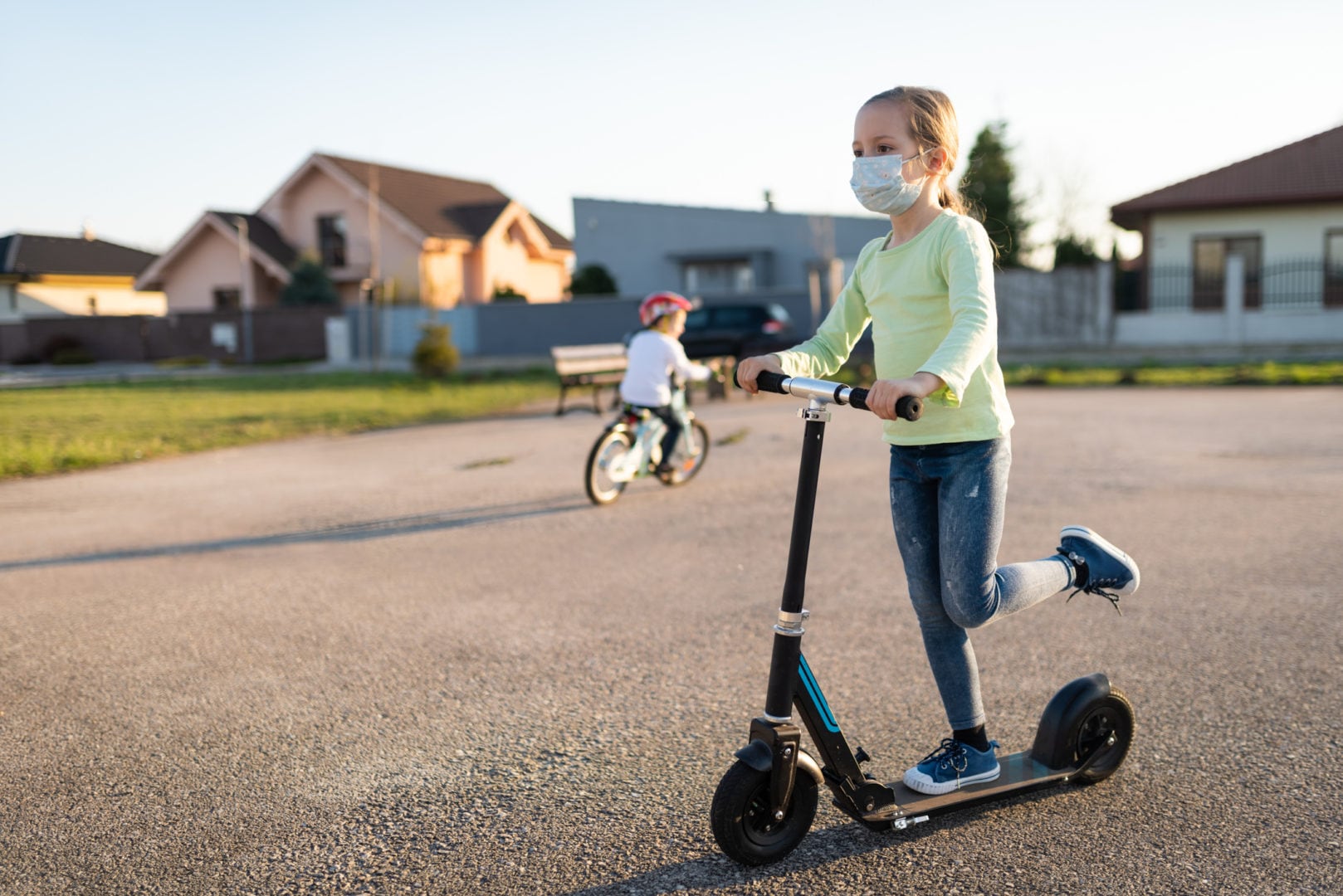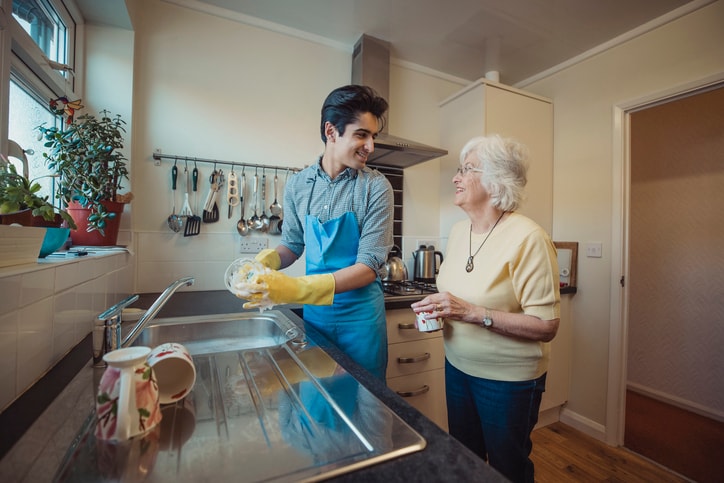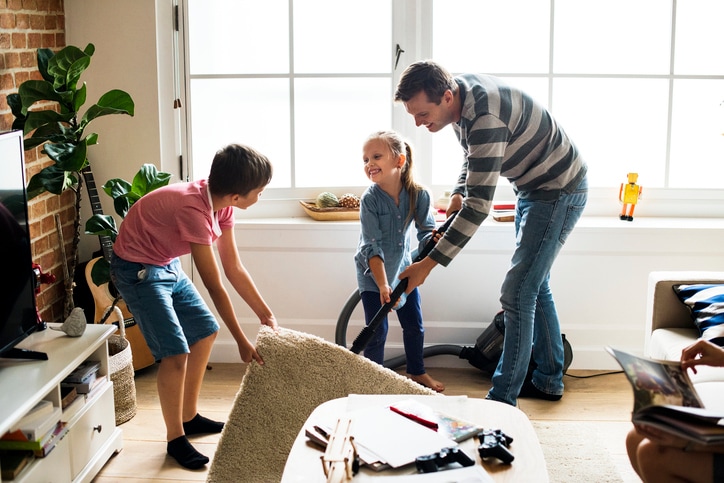Everyone is bearing the brunt of COVID differently, and for kids, the ultimate sacrifice has been face-to-face time with friends. In addition to the school year looking wildly different for most, there have been big changes — if not cancellations — to youth sports, afternoon activities and playdates. Needless to say, not an ideal situation.
“Kids are very social beings and do well with some interaction with their friends,” says Dr. Sara Siddiqui, a pediatrician and clinical assistant professor in the Department of Pediatrics at NYU Langone’s Hassenfeld Children’s Hospital in New York. “Physicians are seeing firsthand an increase in issues like anxiety and depression in children of all ages since COVID — and the observations are consistent with findings from studies of past pandemics and disasters.”
While every in-person interaction carries some risk, there are ways parents and caregivers can up safety precautions, potentially giving kids some semblance of normalcy. Here, experts offer tips for mitigating — not eliminating — risks during pandemic playdates.
Can my child hang out with their friends during the COVID-19 pandemic?
Again, there’s risk involved in any type of in-person interaction right now, but there are protocols that may make playdates safer. However, keep in mind: There aren’t any hard and fast rules here — what may be low risk for some can carry a higher risk for others.
“When it comes to kids spending time with friends, every family has different factors they need to weigh,” says Dr. Jen Trachtenberg, a board-certified pediatrician in New York City. “It’s not just about the child but the whole family unit.” For kids who live and interact with people that have health issues or who are older, it “may not be an option” to be around other families or children right now, according to Siddiqui.
Once individual risks have been taken into account, parents and caregivers can determine the type of playdate with which they’re comfortable. For reference, here are the risk level guidelines for playdates and children interactions during the COVID-19 pandemic from the Centers for Disease Control (CDC):
-
Lowest risk: Virtual playdates, where kids connect with friends via Zoom, FaceTime or phone call.
-
Medium risk: Infrequent in-person playdates with the same kid(s), who are all practicing everyday preventive measures, that take place outside with social distancing measures in place.
-
Highest risk: Frequent in-person playdates with different kids that take place inside without social distancing measures.
Mitigating the risk of outdoor playdates
When it comes to playdates and COVID, staying outdoors definitely carries less risk of transmission than being inside. But even so, there’s still some risk. For kids who are seeing their friends outside, in addition to keeping six feet apart (if possible), Siddiqui and Trachtenberg both recommend having kids over age 2 wear masks. “If space and distancing can be maintained, then outdoors without masking may be appropriate,” Siddiqui adds.
Mitigating the risk of indoor playdates
“Indoor playdates are much more risky than being outside, particularly without a mask,” says Trachtenberg. “Small group gatherings indoors, where no one is wearing a mask, is where I see most risk of being infected by COVID.”
That said, if your child is going to have a playdate indoors, the safest way to do so is to have everyone wear a mask and maintain social distance. “Playdates that are indoors, with appropriate distancing and face coverings would be less risky than indoor crowded areas without masking,” Siddiqui notes. “Also, having moderate air ventilation and minimizing the number of adults and children in one area can mitigate risks.” Put another way: As tempting as it may be to catch up with other parents or caregivers while the kids play, don’t. The fewer people present, the better.
Carpooling during COVID
When it comes to taking kids to and from playdates, it’s best to stick to your own car, as carpooling carries unavoidable risks. “Being in an enclosed space can certainly increase the risk of spreading a virus and most cars don’t allow people to be six feet apart,” says Dr. Dane Snyder, section chief of primary care pediatrics at Nationwide Children’s Hospital in Columbus, Ohio. “If you have no choice but to carpool, make sure everyone sanitizes their hands before and after getting into the car and have everyone over 2 wear a mask.” Trachtenberg also suggests keeping the windows open to circulate air.
Other ways to mitigate playdate risks during COVID-19
In addition to staying outside if possible, social distancing and wearing masks, here are other ways to potentially reduce risks during playdates.
Clean. The CDC advises regularly cleaning frequently-touched surfaces, such as doorknobs and remotes, with soap and water, followed by a disinfectant. Additionally, clean toys and wash plush items according to manufacturer settings.
Pod. “Hanging out with the same limited number of people would mitigate risks greatly,” Siddiqui says. “Maintaining a pod or bubble does reduce the risk of transmission and may make play dates safer. That said, it is still essential to try and have outdoor playdates with face coverings, if possible, to further reduce risk.”
“A few weeks after the holidays we decided to pod with another low-risk family to help get our kids — and ourselves — through the winter,” says Jenna Meyer, a mom of two in Albany, New York. “We try to be outside whenever we can, but it’s freezing! So, we’ve been letting the kids play inside with masks. Our families have similar safety philosophies, so it’s worked out well.”
Minimize adults. “Adults in attendance of playdates should either be minimized or wear face coverings at all times,” Siddiqui adds.
Have open communication. “Speak with the parents and caregivers to assess the situation as a whole,” Trachtenberg says. “Ask questions about who’s been sick recently, who’s vaccinated, how many people they see regularly and their views on masks and social distancing.”
Check for symptoms. If a child isn’t feeling well or was recently under the weather, it’s best to wait before having a playdate. “A playdate with a child who has symptoms that could be caused by COVID, or who has been around someone in the past few weeks who had COVID, increases risk,” Snyder says, who recommends regularly monitoring kids for symptoms.
According to Trachtenberg, most (but not all!) kids with COVID have mild symptoms that may include the following:
-
Runny nose
-
Cough
-
Low-grade fever
-
Vomiting
-
Diarrhea
While kids generally recover quickly, there have been serious cases that have resulted in hospitalization and death (even in kids with no underlying conditions). Also, Siddiqui points out that “infants, toddlers and younger school-aged children tend to transmit COVID a bit less than older adolescents and adults.”
Be mindful of area transmission. Siddiqui also notes that there’s more risk of virus transmission during playdates in areas with high rates of COVID. The World Health Organization (WHO) offers a database with current rates.
Keeping kids social when playdates aren’t an option
For families and caregivers in situations where playdates aren’t a good option, it’s important to make sure kids are getting interaction in other ways. “While there aren’t many studies in the U.S. regarding the long term effects of isolation, there are preliminary studies from China and Italy that show children can have some psychological effects, such as anxiety and depression, after isolation for longer than three months,” Siddiqui says.
If it’s an option, consider keeping kids in school to get a dose of face-to-face time with friends. Research has found that schools are much less risky than social gatherings, with one study finding the transmission rate in schools from August to December to be about .25%.
“Keeping kids in school when possible is a great way for them to socialize,” Trachtenberg says. “And if that’s not an option, make sure they spend time with siblings, see one or two friends via Zoom or in a socially distanced way and/or try to increase family activities together. Having a positive outlook that there is an end in sight with the vaccine can help, as well.”
“Socialization and playdates in children can be done in a safe way and is highly recommended,” Siddiqui says. “Just remember to have safety precautions in place and discuss any specific risks that may be present with a doctor or medical provider.”






